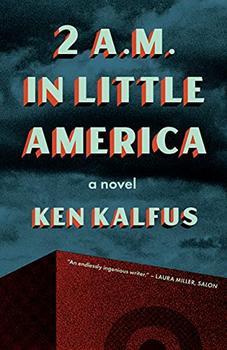Summary | Excerpt | Reviews | Beyond the Book | Readalikes | Genres & Themes | Author Bio

But when I first arrived I was struck by how familiar or semi-familiar the enclave seemed. Some effort had been expended to make the neighborhood more home-like, even if the style of the buildings and the materials used in paving the streets and sidewalks were utterly native to this country. Unofficial signage was posted in English alongside the local undifferentiable squiggles. The principal street was lined with hamburger shops and frozen yogurt stores, some of which assumed vintage American brand names and a limited version of their former signage and trade dress. The enclave was usually identified by a tortuously Anglicized rendering of its original, unpronounceable name. No one called it Little America, but that's how it was thought of by its inhabitants, or at least that's how I thought of it.
I soon learned that the Americans had also imported their divisions. This was inevitable, I suppose. None of our divisions had been erased. The circumstances of living together in a single enclave, however, made it difficult to isolate the political sides geographically, as they were often separated in the States. Some buildings, some neighborhoods, and some places of business went one way or another, unpredictably, but we basically lived on top of each other. This resulted in a constant low-grade insecurity, a buzzing tension. The parties no longer had a country to fight over, so the former paramilitaries had reassembled themselves into criminal gangs still affiliated with their political convictions, even if those convictions were irrelevant in this new place and barely recalled. You'd see their men around, everywhere.
Shortly after I arrived, while I was exhausting my money at a primitive boarding house, I went for a long walk through the district, trying to get my bearings. The streets were full. People wore their clothes in the American style and their faces were recognizably American. They addressed each other in English, with familiar regional accents. It was a relief to hear the language spoken, especially by small children, most of whom, I guessed, hadn't been born in the States. Passing a small factory that had been turned into a primary school, I heard a familiar jump rope rhyme in the yard. If I closed my eyes, I might have thought I was home, for a few moments at least, before being disabused by everything else that was strange about the place. On the main shopping avenue, a hamburger restaurant called itself by the name of the most famous American hamburger brand, which had gone out of business years earlier. The custom-made signage wasn't quite right and neither were the indoor furnishings, which attempted to replicate the uber-familiar furnishings of the original. They too had to be made from scratch, of course, or scavenged from unrelated local businesses. I ordered a burger. I was stunned by how expensive it was and how nasty, nothing like the hamburgers I thought I enjoyed. Fries were unavailable.
Back on the street, I realized that many food and retail outlets had adopted retired brand names, in some cases the names of businesses unrelated to the items they were selling. A sporting goods store had taken on the name of a former supermarket chain; an auto repair shop called itself after a popular jeans brand, with an attempt at the jeans brand's logo in the signage. The names had evidently been chosen because the brands had once meant something. They had each expressed a specific outlook about the world and we considered our purchases acts of self-expression. In those days, in America, one might have assigned a specific character to a person, quite reliably, by where he or she shopped and by the brands he or she valued. You could probably tell how he or she voted. Men with guns could tell too.
***
Soon after I arrived I was hired to inspect the same kind of security equipment that I had serviced in the city on the bay nearly a decade earlier. My employers were pleased with my experience and my proficiency, especially as it was difficult to find native-born repairmen comfortable with working in the enclave. No major changes had been made in the equipment's design. The only difference in the job was that the units, installed all over the world on the roofs of buildings, were almost invariably placed in the enclave's basements and sub-basements. This may have had something to do with the unenforced building codes. I was given a powerful flashlight and advised to wear thick boots.
Excerpted from 2 A.M. in Little America by Ken Kalfus. Copyright © 2022 by Ken Kalfus. Excerpted by permission of Milkweed Editions. All rights reserved. No part of this excerpt may be reproduced or reprinted without permission in writing from the publisher.
Your guide toexceptional books
BookBrowse seeks out and recommends the best in contemporary fiction and nonfiction—books that not only engage and entertain but also deepen our understanding of ourselves and the world around us.